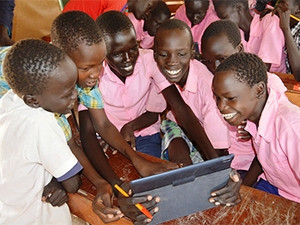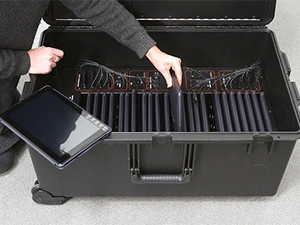
The Vodafone Foundation is launching the Instant Schools For Africa initiative, to provide children on the continent with free access to online learning materials.
The programme will launch this autumn in the Democratic Republic of Congo, Ghana, Kenya, Lesotho, Mozambique and Tanzania.
The online learning materials were developed in conjunction with Learning Equality ? a not-for-profit provider of open source educational technology solutions ? and with education partners, ministries of education and local education experts in each country.
"Education is a powerful antidote to poverty. Children and young people in some of the poorest countries on earth are desperate to learn but parents, teachers and other educators often lack both means and materials to teach them. Mobile and digital changes everything," according to Vodafone Foundation director Andrew Dunnett.
"Our programme will put a wide range of advanced learning materials - tailored for each local language and culture - into classrooms everywhere, from city slums to remote villages. We believe Instant Schools For Africa could transform the life chances for very large numbers of young people."
The educational resources will include subjects such as maths and science - from primary through to advanced high school level - comparable in quality, range and depth to those in schools in the developed world. The materials are curated to align with local standards and include content designed for children who do not benefit from traditional schooling.
UNESCO research found 59 million children aged six to 11 were out of school in 2013, with 30 million of those living in Sub-Saharan Africa.
Vodafone says conventional teaching materials can be prohibitively expensive for many African schools. Digital learning materials provided via mobile networks offer a cost-effective alternative and can be updated instantly, to ensure pupils receive the latest information and insights in the classroom and at home.
A similar initiative was recently launched by Vodafone's South African subsidiary, Vodacom, which worked with the Department of Basic Education to develop a free education portal - Vodacom e-school - that supports the national curriculum.
Boxed solution
The programme is enabled by the creation of the 'Instant Classroom', which Vodafone calls a "digital school in a box". This is a portable case containing equipment to enable tablet-based teaching in schools where electricity and Internet connectivity are unreliable or non-existent.

The Instant Classroom is shipped in a secure 52kg case equipped with a laptop, 25 tablets pre-loaded with educational software, a projector, a speaker and a hotspot modem with 3G connectivity. The tablets can connect to the laptop locally, enabling teachers to deliver content and applications to students without the need to access the Internet.
All the components can be charged simultaneously from a single power source while the case is locked. After six to eight hours of charging time, the Instant Classroom can be used for a full day in a classroom without access to electricity.
The portable nature of the equipment also allows for Instant Classroom to be moved between schools, enabling more students to benefit from tablet-based learning, says Vodafone.
Relevant resources
Educational content hosted by Learning Equality is designed for schools that do not have Internet access but have their own local area network. The content is hosted within Vodafone's core network rather than on third-party servers via the Internet, which optimises the speed and reliability of connection.
Videos are optimised to be low bitrate, the Web pages created by Learning Equality are configured to work over low-bandwidth data connections, and the education modules can easily be stored on mobile devices.
Pupils, teachers, parents and other educators need a data connection to the Vodafone network to access the materials. Vodafone says customers of Vodafone or its African subsidiaries will not incur any mobile data charges when accessing the educational resources.
The company and its foundation will engage with the other major mobile operators in the countries involved, to encourage other providers to adopt a similar non-commercial approach.
The Instant Classroom is being deployed in partnership with the United Nations High Commissioner for Refugees' innovation and education units to schools in refugee settlements in Kenya, Tanzania and the Democratic Republic of Congo.
It is estimated the Vodafone Foundation's work in refugee settlements will benefit at least 62 000 children and young people by the end of 2016, and the foundation is targeting up to three million children and young people in refugee settlements by 2020.
Share